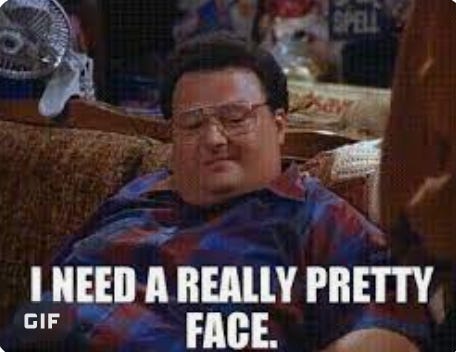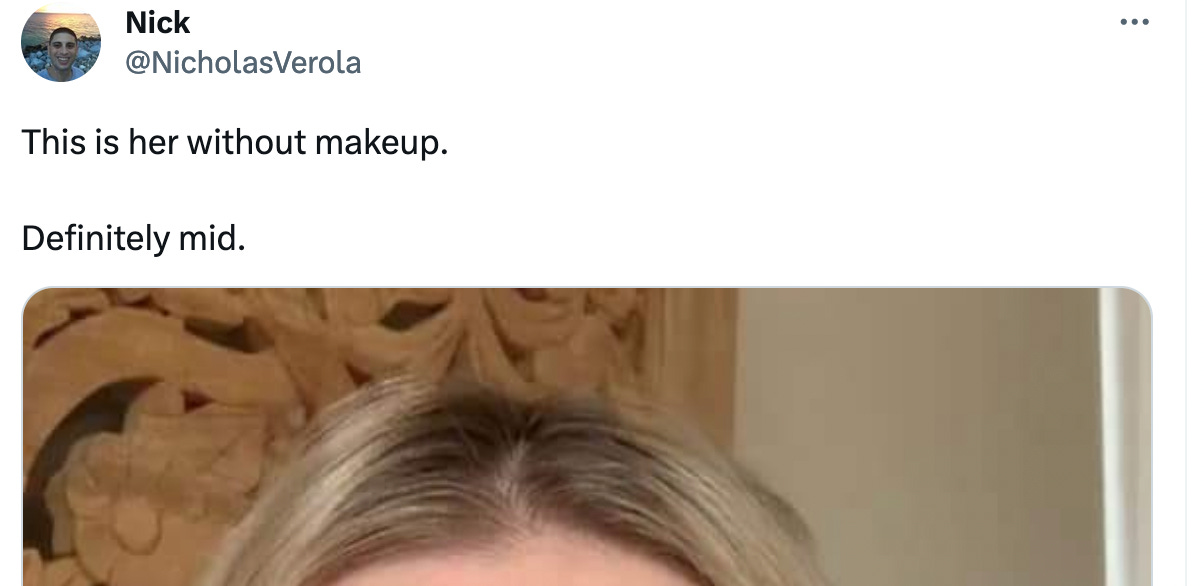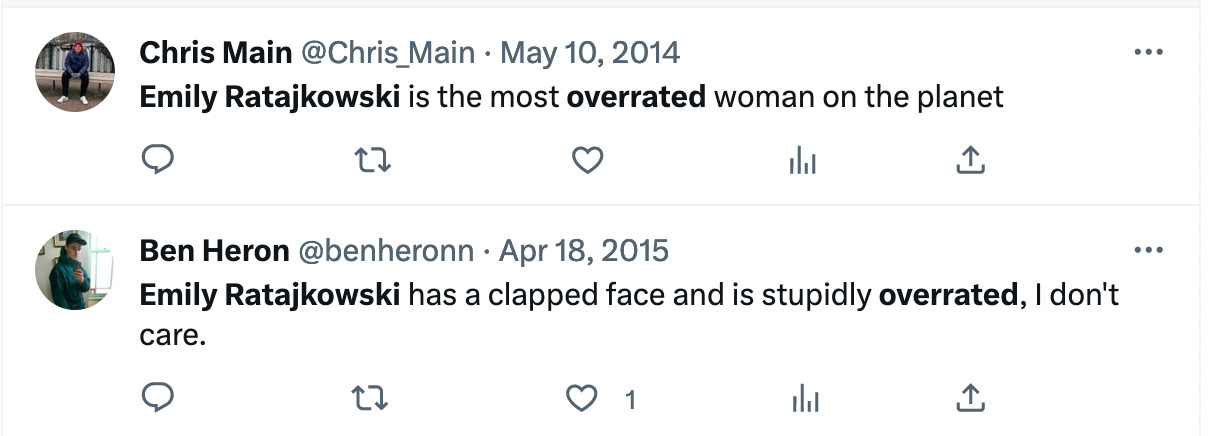
Discover more from Close-reading the reruns with Phoebe Maltz Bovy
'Mid'-century modern
Not a post about dining tables (even though I remain a bit preoccupied with finding one)
Margot Robbie is a very pretty actress who is in fact so pretty that she was cast to play a Barbie doll. So it was only a matter of time until a gentleman on the internet called her “mid.” “Mid,” the young-people-today term for what we more clunkily referred to as “within normal limits.” Where you’re not so unfortunately-looking that this is a setback in your day-to-day life, but where you could not be hired as a cocktail waitress let alone cast as Barbie herself in a major motion picture. Most women are “mid.” I am #OwnVoices on the topic of “mid” as a “mid” myself.

No shame in it—it means you’re to the liking of some, but that your physical appearance doesn’t inspire envy in other women, doesn’t inspire them to go out and buy the same clothes as you. A fashion model cannot be “mid.”
Men of a certain bent enjoy using “mid” in reference to the sort of women historically referred to as “10s.” I have some thoughts about why this is. It’s a way of insulting her, negging her, such that she might feel insecure and run off with him. (The hope-she-sees-this-bro hypothesis.) It’s a way of positing the existence of an actually attractive woman who makes the most stunning women on the planet seem mediocre.

Here’s something it is not. A man calling a supermodel or movie star “mid” is not saying that this is a woman who does nothing for him personally. “Mid” is not a way of saying that beauty is subjective. It is about female beauty as power. It is about rankings.
This is why I don’t think “mid” as a concept could exist in reference to men. There isn’t the same understanding of male beauty as a source of power. All that exists for men, beauty-wise, is in the subjective realm, with most men doing it for some women etc., but not others. There are physical qualities valued in men, but they’re separate from beauty, which, where men are concerned, is much more understood to be a takes-all-kinds sort of thing.
This means that there are no men ‘just’ within normal limits, because that’s the best any man can hope for. No man on earth would draw the kind of consensus that would allow his beauty to be marketable the way female beauty can be. It’s not just that men have other routes to power. This is a route they don’t have.
For this reason, there’s no such thing as negging a beautiful man about his looks. What would that even mean? Telling a gorgeous skinny man he’s not muscular, or a fitness hunk that his BMI is a bit hmm? There’s no point because he knows he’s a type, not all types simultaneously.
Female beauty is subjective too, though. There isn’t one woman wanted by all wanters of women, or even just by all men. But! There exists parallel to that subjective level this other level where rankings live. Where you can say yes, this is a woman whose physical presence makes other women jealous, whose image can sell merch, and whose presence on a man’s arm confers status to him (even if his actual type is someone else entirely).
This is why it’s a very different statement if I say Ryan Gosling does nothing for me than if a man says the same about Margot Robbie. If I say this I’m saying something about who does it for me. I’m not saying anything whatsoever about whether it is appropriate for Gosling to be considered a heartthrob actor. Why would he care that I prefer Steve Pemberton, and also maybe the actor from Doc Martin no not the main one, the one who plays the goofy police officer in the early seasons? But if a man says Robbie isn’t all that, he’s insulting her looks and power. This is why, I think, part of Emily Ratajkowski’s memoir, My Body, is about her intense concern that somewhere, there might be a woman objectively better-looking than she is.
Subscribe to Close-reading the reruns with Phoebe Maltz Bovy
All the clothes, interiors, and cultural politics of TV shows very much not of the moment.














I think for some of these guys it's jealousy and resentment that women have any power at all. The neg as you say works on a personal level (make the woman insecure); lashing out against Margot Robbie is more of a meta-neg, against a woman having visibility, making money, in ways not only beyond what these guys will ever have but beyond what they think women deserve.
Did I miss your writing on *My Body*?! I’m so fascinated by the premise of this memoir (though admittedly not even to read it...) and I wish you’d say more. Love your work and perspective, Phoebe!